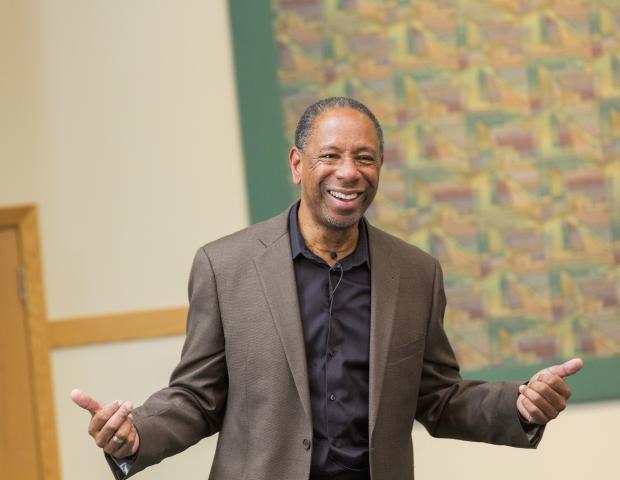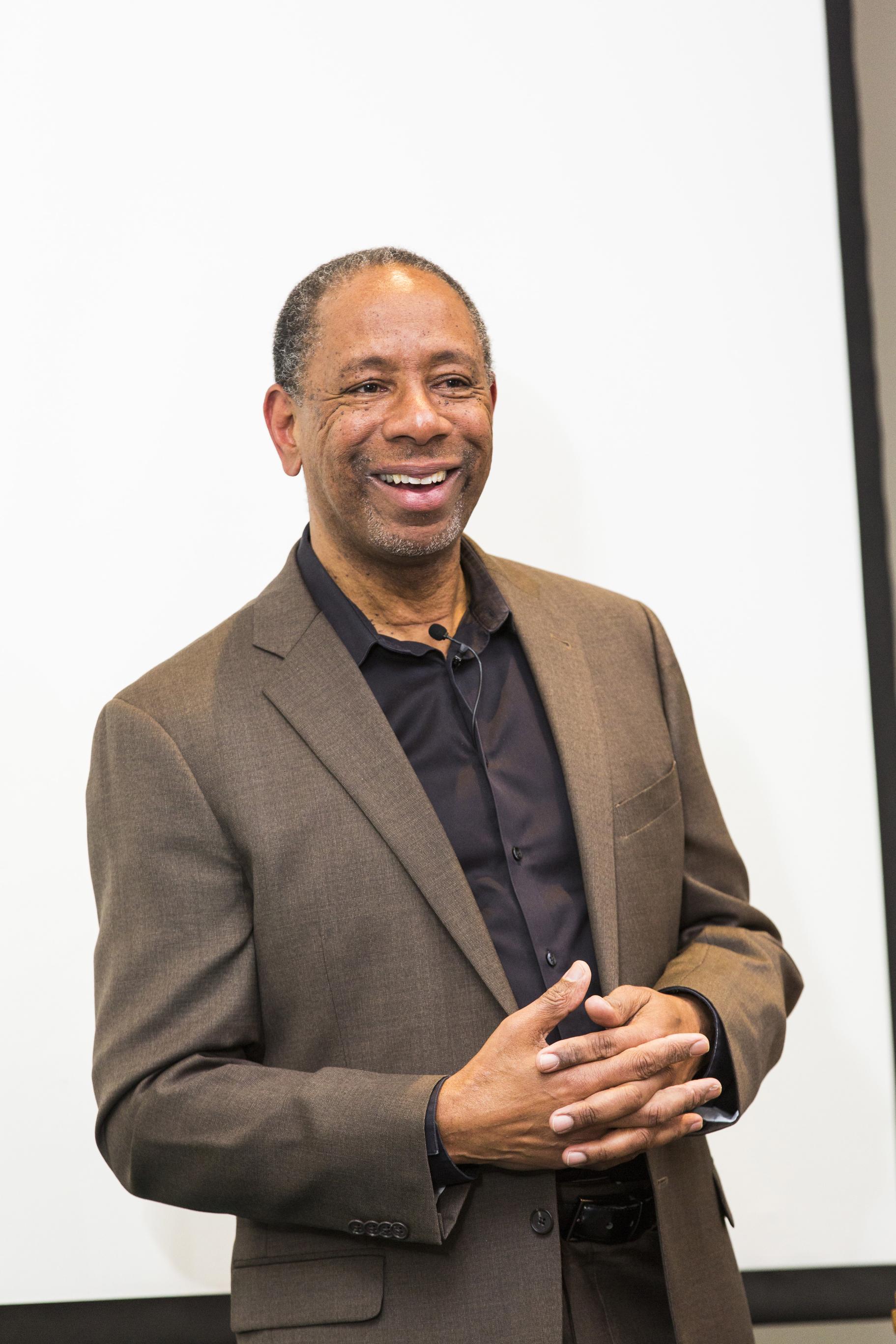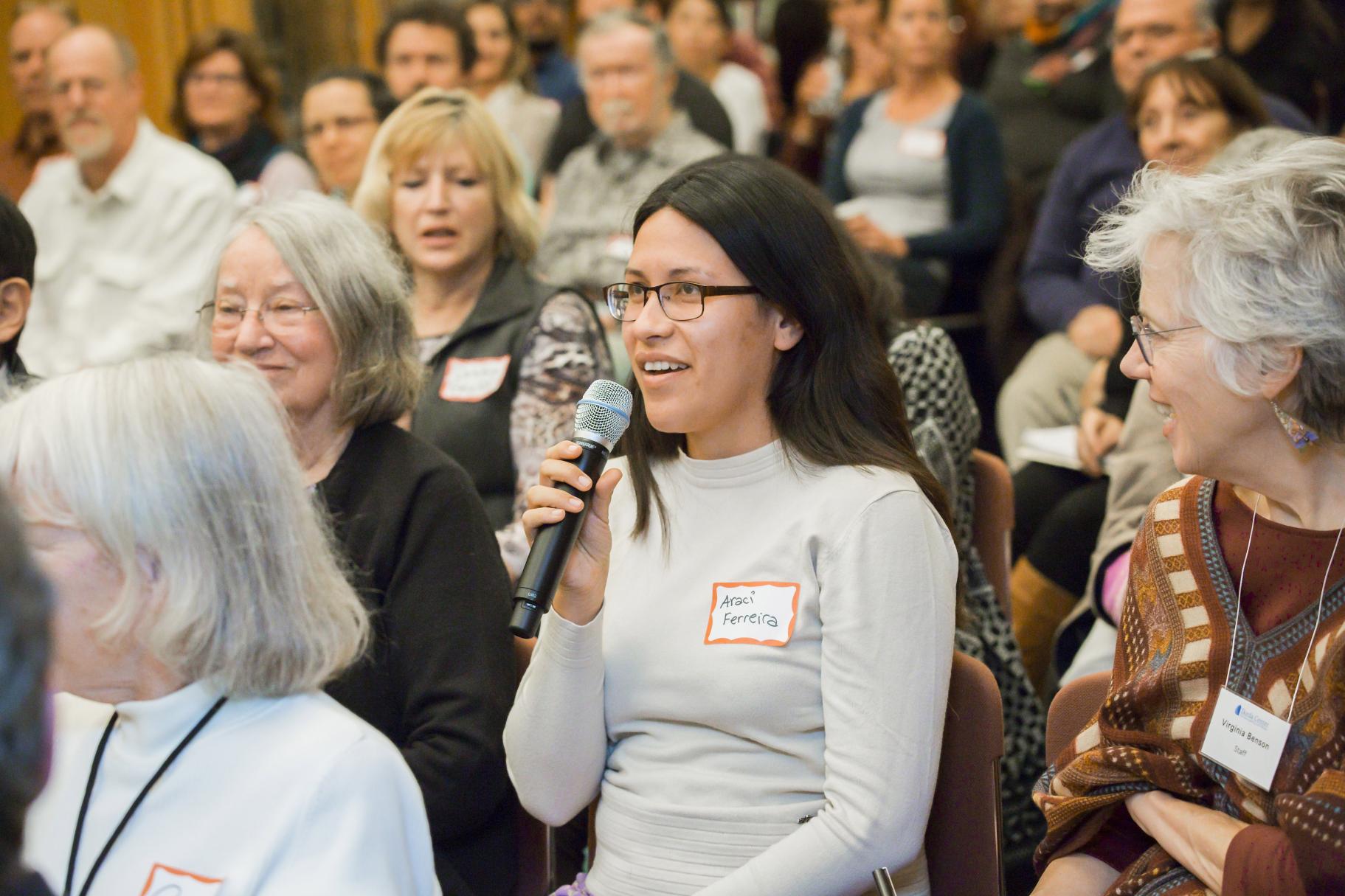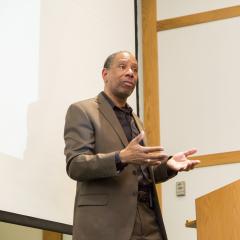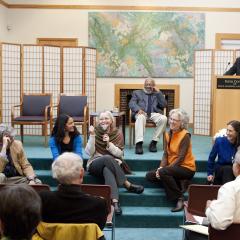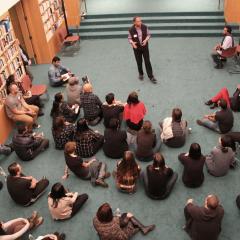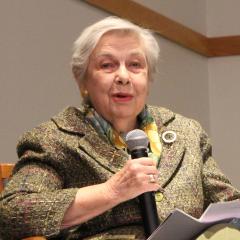2016 Ikeda Forum: Democracy, Inclusion, Community
Dr. Ceasar McDowell of MIT presents at the 2016 Ikeda Forum
Compared to what he envisions as the work of true democracy, the current presidential contest, said Ceasar McDowell, defined as it is by rancor and a scarcity of content, amounts to little more than theater.
McDowell offered this perspective in his role as the featured speaker and dialogue facilitator at the 13th Annual Ikeda Forum for Intercultural Dialogue, called “Crisis or Opportunity: A Dialogue on Democracy, Inclusion, Community.” Held at the Ikeda Center on October 27, just twelve days before the 2016 elections and near the end of a year marked by bitter and emotional conflict across the United States, the event featured a capacity crowd who came ready to look deeply and carefully into what is needed to bridge the seemingly unbridgeable expanses that divide us.
Ceasar McDowell is president of the Interaction Institute for Social Change and Professor of the Practice of Community Development at MIT. His presentation drew upon his considerable experience participating directly in the work of community building. By way of introduction, and to give the audience a feel for Dr. McDowell’s outlook, Ikeda Center events manager Kevin Maher offered two quotes from a recent interview (see sidebar) with McDowell. First is his observation that
my work, my research interests, my life are about voice. And particularly, how people—specifically people who are at the margins of society—are able to name their experience in the world, have that naming be recognized and also open themselves up to the experience of others.
Next is his conviction that the task before us
is to communicate, demonstrate, and create places of experimentation to show that it is possible for the public to come together and create peaceful ways to interact to address [key] issues in ways that lead to an improvement on the past.
This latter idea reveals why Dr. McDowell’s remarks did not deal directly with today’s hot button issues — police accountability and community safety, debates about global climate change, etc. — but instead invited everyone to take a step back and consider how we can build structures capable of effectively engaging with those issues, or as he put it: “creating the containers in which the peaceful struggle can happen.” These containers, he said, must possess the capacity to take the most demographically complex populations imaginable, such as we find today in the US, and enable them to actually be in relationship with one another, especially with those we too often see by default as “the other,” simply too different to understand — or too suspect to validate.
What We Are Trying To Do
Before getting into the particulars of those containers for deep dialogue, Professor McDowell offered a few big picture ideas to frame the discussion. First, it is essential that, as Maher mentioned in his introduction, we engage those at the margins of society in any activity or policy aimed at the improvement of society. After all, they are the ones who live with the failures of the system, so without their participation true solutions will be elusive.
Further, these people must be understood as real, nuanced individuals and not just as statistics. To explain, McDowell offered a metaphor based on an experience from his own life. Years ago, he suffered a fall that severely injured his back, even requiring traction at one point. After several medical specialists came up empty with strategies to help him heal, McDowell visited an orthopedic surgeon who was broadening into complementary medicine. During the initial examination McDowell experienced a revelation when he realized that she was the first of his physicians to actually touch his entire body during diagnosis as opposed to mostly relying on x-rays and scans. “Everyone was trying to cure me by looking at representations of me,” he recalled, concluding that the trend toward Big Data, not without certain benefits, tempts us just to deal with representations of the public.
McDowell also emphasized that the work of true democracy, community, and inclusion is long-term work. How long-term? He cited approvingly a peace group in Sri Lanka, who he learned (from a colleague who worked at an NGO there) was developing a “500 year plan” for a set of social goals. Impressive as that is, said McDowell, when goals are that distant and ambitious, it remains critical to seek regular, “equitable improvements” in social conditions. Part of the problem is that the scope of the project is daunting, but also that “we don’t have the language for transition” — a language that can help us “hold the past while moving forward.” This, said McDowell, is our work.
Needed Capacities & Guiding Principles
The containers we create for democratic engagement need to be capable of facilitating six forms of dialogue, said McDowell. First is dialogue focused on framing issues to enable shared understanding. The goal here is not to make decisions but to honor complexity. This first step is crucial, because our understandings even of common events are always different simply because of who we are, where we are coming from, and what we recall. If someone out on the street, suggested McDowell, were to ask people leaving tonight’s event what just happened that person would get a multitude of answers. That’s just the way it is, said McDowell.
The next mode of dialogue is “ideating,” which aims at offering possible solutions to the question or problem being considered. The third form of dialogue calls for the prioritizing of those possible solutions, weighing the relative value of each. Dr. McDowell stopped here to emphasize the importance of this step. It is nothing less than “transformative,” he said, to understand that there are no absolutes in the work of community transformation; there are always trade-offs. Too often, said McDowell, “we end up making choices about solutions,” which is not the same thing as clarifying “the values we agree on and what we are willing to trade-off” based on them. Finally, the focus of dialogues shifts toward action steps: agreeing on the paths forward; implementing the plan or plans; and realistically monitoring impact.
To conclude his prepared remarks, McDowell turned to the principles that should guide the construction of containers capable of enabling constructive community transformation. Again, the principle of designing for the margins got top priority. Why? Because designing for the margins automatically covers everyone in the middle, a concept he grants is “counterintuitive.” Unfortunately, said McDowell, the default American position is to design for the middle, a well-intentioned but ineffective strategy that ends up further marginalizing various populations. Next the structures for transformative dialogue must be designed for equity.
Third, they must be designed for collaboration and systemic change. Ironically, said McDowell, that most cherished of American democratic institutions, the town hall meeting, comes up short here. This is because the town hall meeting is an artifact of colonial New England, when populations were small and homogenous. In fact, the original town halls were designed more in terms of exclusion – defined by who was not included, for example because of gender or religion – than by inclusion of the type we rightfully expect today. “How could a system designed and defined by who was and was not in it be adequate to our needs?” wondered McDowell.
Finally, structures must be designed for multiple modes of expression (not just verbal, but visual and musical and more); designed for both “analog” and “digital” participation; and finally, and perhaps most crucially, they must be designed for healing. And by this, McDowell meant healing on the part of everyone, not just those most readily identified as “victims.” All of us, he said, “are wounded by the ways we have had to engage with each other” in our society.
McDowell ended by offering a thought to guide our efforts in support of inclusion, community, and democracy: “Every effort to change the world for the better begins with someone asking why ‘this’ is so, and raising up their experience to the world.” Our challenge, said McDowell, is “to create those places where everyone’s voice can be raised up.”
Q & A
In order to encourage generative ideas to guide the concluding Q & A and dialogue, attendees paired up for a few minutes of conversation on themes that jumped out at them during Dr. McDowell’s presentation. The result was a discussion distinguished by uniformly thoughtful questions and contributions. Here are some highlights, all of which are representative of other questions and comments offered along similar lines.
The margins and the middle
How exactly does designing for the margins end up helping the middle? In response to this question, Dr. McDowell told the story of how sidewalk curb cuts came to be. Soon after WWII, in 1945, staff at a veteran’s center in St. Paul, Minnesota, realized that a great number of their clientele were wheelchair bound, and were unable to enter the facility without staff coming out to help them up and over the curb. Their response to this particular challenge was to petition the city to cut ramps into the curbs, an innovation that is now ubiquitous and required by law, and which helps all manner of people beyond the disabled, not least parents with strollers. “Here was something done to serve a group marginalized by the infrastructure that was there,” observed McDowell, “that ended up serving so many people that didn’t even know they needed it until it was put into place.”
An exemplar
Asked for examples of organizations or governments doing the work he envisions, Dr. McDowell mentioned a couple, including Black Lives Matter, which is at the forefront of contemporary justice movements. But McDowell cited BLM not for their work engaging the larger community in justice issues, but for their work trying to develop a unified message while dealing with the internal complexity of the black community, frequently misunderstood as monolithic. In fact, said McDowell, “this is the first space I actually know of where the complexity of what it is to be black is actually front and center in the dialogue.” It isn’t smooth, and it’s definitely a struggle, said McDowell, but this seems to him the reason it’s enduring.
Is American democracy failing?
Midway through the Q & A, one attendee good-naturedly pushed back against what he perceived as McDowell’s implication that American democracy is failing. In his view, the primary system as devised in the US brought Hillary Clinton more into line with her party’s values, and such imperfect mechanisms of American democracy as the televised debates have helped voters clarify their choices. McDowell did not disagree, but distinguished between politics and democracy. The work of democracy includes what happens outside of the political arena, said McDowell, and regardless of who wins the 2016 election it seems we will be no closer to healing our divisions or addressing our biggest problems. That being said, McDowell added that one big problem is quite simply that, while they can certainly coexist, capitalism and democracy are now “too intertwined” in a way that’s unhealthy for democracy.
How can we include those we disagree with?
In response to a question about the challenge of dealing with deep disagreement, Dr. McDowell observed that “maybe us progressives aren’t as inclusive as we think we are.” His point was that the best advice is “to model in your own homes and organizations real inclusion.” If you don’t, and you go out there as he does promoting community inclusion, “your hypocrisy stands out” immediately. He then invited others to answer this question. One participant, a science teacher, said that he has learned to express his trust in students by asking them the question: What do you see? They feel empowered when they feel they can respond honestly and directly about what their eyes are telling them. Another participant said that through his work with developmentally disabled men he has learned to “meet them where they are at.” When they resist the help he knows they need, he tries to “think the way they think” and understand that they are resistant to receiving help because of the way they perceive themselves to be stigmatized by society. Another participant said she practices introspection on a daily basis, and this forms the basis for her social and professional interactions.
Talk and action
Near the end a participant asked, Is it possible that all this focus on dialogue actually keeps us from acting? McDowell responded that dialogue is the foundation for effective social action. What dialogue does is create “collective mindfulness,” increasing the chances that the actions we choose will do the most good for the broadest swath of society, and that we will “act in relationship with the set of values [we] want to honor.” Yes, we need action, said McDowell, but we also need consciousness. Another person asked about the all-too-frequent occurrence of “activism fatigue.” To that, McDowell replied with the classic advice that there’s no point in pursuing revolutions if there won’t be dancing too.
Conclusion
As the event concluded it became apparent that the question of crisis or opportunity was not the question at the heart of Dr. McDowell’s talk. The more fundamental question was the one that he opened with, and the one he wanted participants to walk away thinking about: “What is the relationship,” he asked, “between how we talk to each other, as well as the conditions under which we talk to each other, and our ability to be inclusive, to be in community, and to make democracy work?
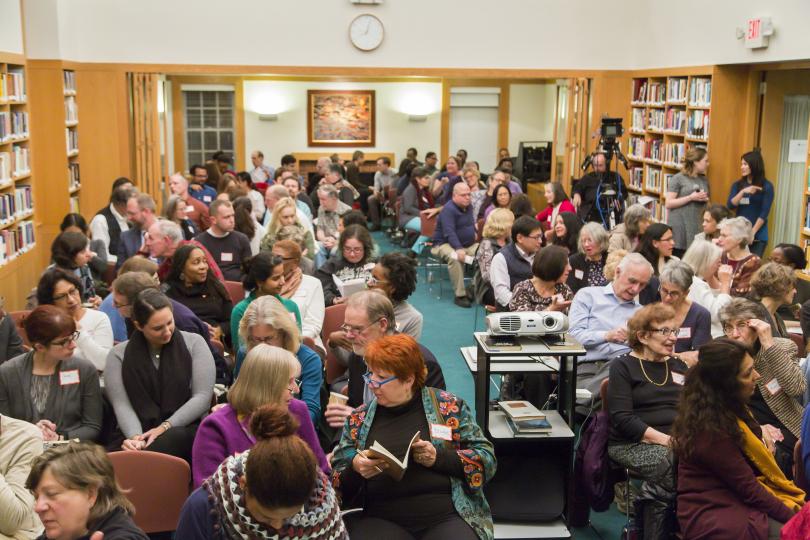
Breakout groups during the 2016 Ikeda Forum
Photos by Marilyn Humphries
